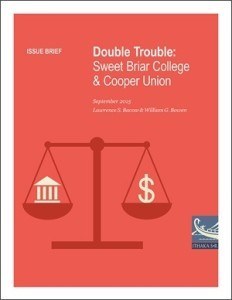Double Trouble
Sweet Briar College and Cooper Union
Lawrence S. Bacow, president emeritus of Tufts University and leader in residence at the Harvard Kennedy School, and William G. Bowen, president emeritus of Princeton University and founding chairman of ITHAKA, have commented recently on the ill-fated interventions by state attorneys general into the operations of American colleges as they attempt to make strategic shifts to address imposing financial challenges.
Today in our latest issue brief, Double Trouble: Sweet Briar College and Cooper Union, Bacow and Bowen share a more wide-ranging set of insights on the complexity of navigating fundamental change at our colleges and lessons to be taken from these two recent and highly-public cases where leaders working to address market and financial realities had their paths derailed under the myopic scrutiny of their state governments, alumni, and the public.
Bacow and Bowen encourage pulling back to a longer-term view—a perspective that all of these constituents and even college leaders themselves can struggle to take, but which is essential for the right decisions to be made if our higher education institutions are to endure in today’s world.
Interested? Read Double Trouble: Sweet Briar College & Cooper Union.

Comments
There iis an astound amount of misinformation in this related to Sweet Briar. This hardly constitutes "research". This is news aggregation from one point of view, at best. The Sax study has been debunked. The deferred maintenance claims were overstated. "The bonds" we're not the problem - the ill-fated default provision of of their bonds was the problem. The claims by Moody's have been thoroughly refuted. Yet...people continue to regurgitate information and spin released by Sweet Briar's board as the irrefutable golden word of God. Check out the other side of the story, which is based on facts, figures, and has primary sources cited: www.unsolicited.guru
Interesting take, but I wonder why you describe the AG’s intervention with Sweet Briar as “ill fated” so soon. Seems to me the jury is still out and will be for four years. They’ve already pulled off a fall semester, added $12 million to their endowment, which was $84 million—in just 100 days—they have more than 300 students total including a freshmen class—Bloomberg was predicting 200 and when Wilson College went through something similar in ’79, they came back with 110. If they can keep the donations coming to help a small freshmen class through the next four years, and increase their enrollment, they will have pulled off their turn around, then it wasn’t ill fated at all. While “market realities” do mean intense competition and that young women need to be sold on the benefits of single-sex education (although 2% of women graduated from women’s colleges they make up 20% of women in congress), leaving the chiefs of marketing and enrollment posts vacant won’t help, nor does it qualify as a “market reality” so much as an epic fail. The Roanoke Times argued that perhaps more oversight is needed, not less, to protect whole sectors from the domino effect of such bad decision making (http://www.roanoke.com/opinion/editorials/our-view-who-s-the-watchdog/article_36b50029-db27-55c4-862d-6570679ba6e6.html ).
Is this the same market realities that told the old BoD to not even bother to contact the alumnae for a fundraising campaign? And all the other "Reality Distortions," that only came up with: "Let's give up without a fight and just shut down?"
It's been almost 5 months since Mr. Bowen and Judith Shapiro wrote for the Richmond Times Dispatch and he apparently has not read a single comment on that article nor updating his thinking on this topic to reflect a single new fact. This article is filled with bunk. A huge piece of the bunk is the fear of the Attorneys General actually doing their jobs. Apparently in Virginia you don't have to worry about that. Far from an activist intersession, Mr. Herring submitted a voluminous amicus brief on behalf of those attempting to close Sweet Briar, arguing a point that was later refuted by the Virginia Supreme Court. His intersession AGAINST those attempting to save the college cost those fighting, the college, and the state, hundreds of thousands of dollars and months of time. He only capitulated to "stewarding" a long, drawn out mediation process (burning further dollars and daylight) when he realized that his last election had been won by an order of magnitude fewer votes than there are Sweet Briar alumnae who vote in Virginia. Every other point here could be as easily refuted, but I'll rest with this one and wait for the next article to see if Mr. Bowen is yet still capable of entertaining new points of view.